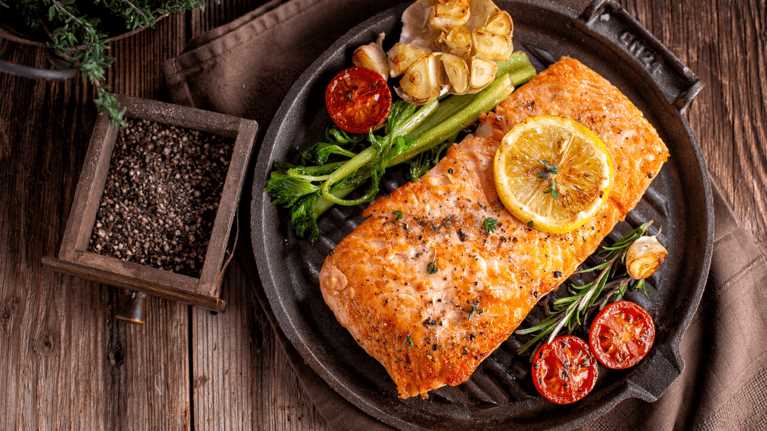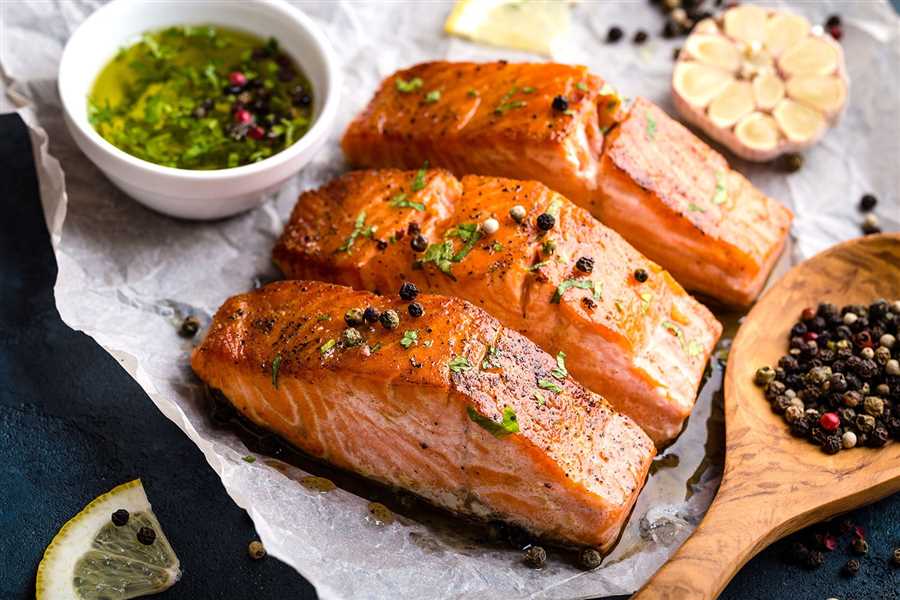Pregnancy is a time of many changes and considerations when it comes to diet and nutrition. It’s important for expectant mothers to be aware of the foods they consume to ensure their own health and the health of their baby.
One commonly discussed food during pregnancy is salmon. Salmon is a nutritious fish that is rich in omega-3 fatty acids and protein. These nutrients are beneficial for both the mother and the development of the baby.
However, it’s important to note that not all types of salmon are safe for pregnant women to consume. Raw or undercooked salmon can pose a risk of bacterial and parasitic infections, such as salmonella or listeria. These infections can be harmful to the mother and the baby.
The good news is that cooked salmon is generally safe to eat during pregnancy. Cooking salmon to an internal temperature of 145°F (63°C) ensures that any harmful bacteria or parasites are killed. By following proper food safety guidelines and cooking salmon thoroughly, pregnant women can enjoy this nutritious fish as part of a balanced diet.
Benefits of Eating Cooked Salmon during Pregnancy
Salmon is a highly nutritious fish that can provide numerous benefits for pregnant women. Its consumption during pregnancy is generally considered safe and recommended by healthcare professionals.
Rich in omega-3 fatty acids: Cooked salmon is an excellent source of omega-3 fatty acids, particularly EPA (eicosapentaenoic acid) and DHA (docosahexaenoic acid). These essential fats are important for the development of the baby’s brain and eyes.
High in protein: Pregnant women need increased protein intake to support the growth and development of the baby. Salmon is an excellent source of protein, which is essential for the formation of cells, tissues, and organs.
Essential vitamins and minerals: Cooked salmon is rich in vitamins and minerals that are essential for a healthy pregnancy, such as vitamin D, vitamin B12, and selenium. These nutrients can help support the immune system, regulate hormones, and promote overall well-being.
Supports fetal growth: The high nutritional content of cooked salmon can promote healthy fetal growth. The omega-3 fatty acids in salmon have been shown to contribute to the baby’s brain development and may help prevent preterm birth.
Reduces the risk of gestational diabetes: Eating cooked salmon during pregnancy can help reduce the risk of gestational diabetes. The omega-3 fatty acids in salmon can improve insulin sensitivity and regulate blood sugar levels.
May alleviate postpartum depression: The omega-3 fatty acids in cooked salmon have been linked to a reduced risk of postpartum depression. Including salmon in the diet during pregnancy can potentially have a positive impact on maternal mental health.
It is important to note that pregnant women should avoid consuming raw or undercooked salmon, as it may contain harmful bacteria or parasites. It is recommended to cook salmon thoroughly until it reaches an internal temperature of 145°F (63°C) to ensure safety.
In conclusion, incorporating cooked salmon into the diet during pregnancy can provide various benefits, including the supply of essential nutrients for fetal development, reduced risk of certain complications, and potential mental health benefits for the mother. However, it is always advisable to consult with a healthcare professional for personalized advice and guidance.
Nutritional Value
Salmon is a nutritious fish that is packed with essential nutrients beneficial for both the mother and the developing baby during pregnancy. Here are some key nutritional values of cooked salmon:
- Protein: Cooked salmon is an excellent source of high-quality protein, which is essential for the growth and development of tissues in the body.
- Omega-3 fatty acids: Salmon is rich in omega-3 fatty acids, particularly EPA and DHA. These fatty acids play a crucial role in the development of the baby’s brain and eyes.
- Vitamin D: Cooked salmon is one of the few dietary sources of vitamin D, which is important for bone health and immune function.
- Vitamin B12: Salmon contains a significant amount of vitamin B12, which is essential for the formation of red blood cells and the proper functioning of the nervous system.
- Selenium: Salmon is a good source of selenium, a mineral that acts as an antioxidant and helps protect cells from damage.
It is worth noting that the nutritional value of salmon may vary depending on the cooking method and any added ingredients. To maximize the benefits, it’s best to opt for simple cooking methods, such as grilling, baking, or steaming, and avoid excessive use of oils or sauces.
Omega-3 Fatty Acids and Brain Development
Omega-3 fatty acids are important nutrients that play a crucial role in brain development, especially during pregnancy. These fatty acids are essential for the growth and development of the fetus’s brain, and are needed for optimal visual and cognitive development.
DHA: An Important Omega-3 Fatty Acid
One specific omega-3 fatty acid, called docosahexaenoic acid (DHA), is especially important for brain development. DHA makes up a significant portion of the brain, and it is necessary for the formation and maintenance of cell membranes.
During pregnancy, the demand for DHA increases as the fetus’s brain undergoes rapid development. Adequate intake of DHA during pregnancy is associated with improved cognitive function, attention, and behavior in children.
Sources of Omega-3 Fatty Acids

To ensure sufficient intake of omega-3 fatty acids during pregnancy, it is important to consume foods rich in these nutrients. Good sources of omega-3 fatty acids include fatty fish, such as salmon, mackerel, and sardines.
Cooked salmon can be a safe and healthy choice during pregnancy, as long as it is properly prepared and cooked to kill any potential bacteria or parasites. It is recommended to consume cooked fish in moderation, while avoiding raw or undercooked fish to minimize the risk of foodborne illnesses.
For those who do not consume fish or prefer other options, omega-3 fatty acids can also be obtained from plant-based sources, such as flaxseeds, chia seeds, and walnuts. However, it is important to note that the body may not efficiently convert plant-based omega-3 fatty acids into the form that is most beneficial for brain development.
In some cases, healthcare providers may suggest omega-3 fatty acid supplements to ensure adequate intake during pregnancy. It is recommended to consult with a healthcare professional before starting any supplements.
In conclusion, omega-3 fatty acids, especially DHA, are vital for brain development during pregnancy. Consuming cooked salmon or other good sources of omega-3 fatty acids, along with a balanced diet, can support the optimal brain development of the growing fetus.
Low Mercury Content
One of the concerns when it comes to consuming salmon during pregnancy is the mercury content. Mercury is a heavy metal that can be found in some fish and seafood, and it has been linked to various health issues, particularly in developing fetuses and young children.
However, salmon is considered to be a low-mercury fish. This means that it contains relatively low levels of mercury compared to other types of seafood. The Food and Drug Administration (FDA) and the Environmental Protection Agency (EPA) in the United States recommend that pregnant women can safely consume up to 12 ounces (340 grams) of low-mercury fish per week.
Salmon is also a good source of omega-3 fatty acids, which are beneficial for both the mother and the baby’s development. Omega-3 fatty acids have been shown to support brain and eye development in infants, as well as reduce the risk of preterm birth and promote a healthy birth weight.
However, it’s important to note that not all types of salmon have the same mercury levels. Wild-caught salmon generally has lower levels of mercury compared to farmed salmon. If you’re concerned about mercury levels, it’s a good idea to choose wild-caught salmon over farmed salmon.
When consuming cooked salmon during pregnancy, it’s important to ensure that it is properly cooked to reduce the risk of foodborne illnesses. The FDA recommends cooking fish until it reaches an internal temperature of 145°F (63°C) to kill any potential bacteria or parasites.
Overall, cooked salmon can be a safe and nutritious choice for pregnant women due to its low mercury content and high omega-3 fatty acid content. However, it’s always a good idea to consult with your healthcare provider before making any significant changes to your diet during pregnancy.
Reduction in Heart Disease Risk
Consuming cooked salmon during pregnancy can potentially reduce the risk of heart disease. Salmon is rich in omega-3 fatty acids, which are essential for heart health. These healthy fats have been shown to lower blood pressure, reduce triglyceride levels, and decrease inflammation in the body, all of which contribute to a lower risk of heart disease.
Omega-3 Fatty Acids

Salmon is a great source of omega-3 fatty acids, specifically eicosapentaenoic acid (EPA) and docosahexaenoic acid (DHA). These fatty acids are not naturally produced by the body, so it’s important to obtain them through diet. Omega-3 fatty acids have been found to have numerous cardiovascular benefits, including reducing the risk of abnormal heart rhythms, improving blood vessel function, and reducing the risk of blood clotting.
Studies have shown that consuming omega-3 fatty acids during pregnancy can have long-term benefits for the child as well. It may help with proper brain development and reduce the risk of certain mental health conditions later in life.
Safe Consumption of Cooked Salmon
When pregnant, it is important to ensure that the salmon is properly cooked to reduce the risk of foodborne illnesses. Raw or undercooked fish can contain bacteria or parasites that may harm both the mother and the baby. It is recommended to cook salmon until it reaches an internal temperature of 145 degrees Fahrenheit (63 degrees Celsius) to ensure it is safe to consume during pregnancy.
Important: It is advisable to consult with a healthcare professional before making any significant dietary changes during pregnancy to ensure the best possible health outcomes for both the mother and the baby.
Questions and answers
Can I eat cooked salmon when I’m pregnant?
Yes, you can eat cooked salmon when you’re pregnant. In fact, it is recommended to include cooked salmon in your pregnancy diet as it is a good source of omega-3 fatty acids and a great low-mercury fish option.
Is it safe to eat cooked salmon during pregnancy?
Yes, it is safe to eat cooked salmon during pregnancy. However, it is important to ensure that the salmon is fully cooked to kill any potential bacteria or parasites that can cause foodborne illnesses.
How often can I eat cooked salmon while pregnant?
You can safely consume cooked salmon 2-3 times per week during pregnancy. It is important to have a varied diet and not rely solely on salmon for your omega-3 fatty acids intake.
What are the benefits of eating cooked salmon during pregnancy?
Eating cooked salmon during pregnancy has several benefits. Salmon is a good source of omega-3 fatty acids, which are important for fetal brain and eye development. It also provides protein and essential nutrients like vitamin D and B vitamins.
Are there any risks associated with eating cooked salmon when pregnant?
While cooked salmon is generally safe to eat during pregnancy, there are some risks to consider. It is important to avoid raw or undercooked salmon, as it can contain harmful bacteria or parasites. Also, if the salmon is high in mercury, it is advisable to limit your consumption as high levels of mercury can be harmful to the developing baby.






